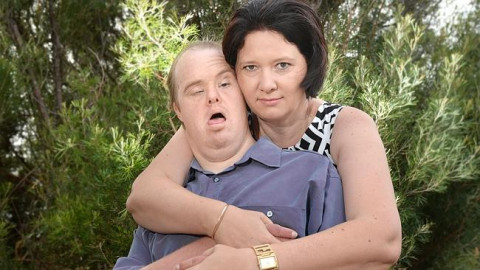
MARKY Roberts cannot speak but he has a growing voice in his Victor Harbor community, which is speaking out to protect him.
The 38-year-old, who has severe Down syndrome, is at the centre of a battle affecting hundreds of South Australia’s intellectually disabled adults who face being chemically or physically restrained for even the most basic medical care.
Government-employed care workers are shifting away from using orders that allow them to use only limited methods to restrict patients needing medical help, instead opting for much more invasive intervention.
For Mr Roberts, it means he can expect to be sedated or strapped to an ambulance bed for medical care. Previously, he required only chips and chocolates to endure the process.
Now, if Mr Roberts needs medical help and his guardian, sister Kathryn Roberts is not present, his supported housing carers say they will opt for the more restrictive approach.
This means Mr Roberts would be put in an ambulance where he would be sedated or “netted from head to toe”.
Ms Roberts has labelled the move a “barbaric practice” but her bid for action from Disabilities Minister Tony Piccolo and requests for support from Dignity for Disability MP Kelly Vincent has so far provided little comfort.
Now she is gathering support from the Fleurieu Peninsula and dozens of families who were helped by the pair’s deceased parents, Mary and Lloyd, who were integral disability advocates in the region. The couple helped establish the Victor Harbor special education units and a care farm near their dairy farm at Inman Valley.
“We were told what the processes would be, that (the care workers) would refuse to help by using the low level of contact that would be required,’’ Ms Roberts said.
“I would have to employ someone else if I am away from the area, or cannot get to him within 10 minutes.
“A lot of parents don’t realise that once their kids turn 18, they don’t have the first say in the care of their children — it lies with the Guardianship Board. The laws are there so carers can touch and help the clients but no-one has the sense to use them as they are intended.’’
Mr Roberts’ GP, Dr Justin Shute, has supported the push for a review of the laws and suggests they need to be considered on an individual basis.
“You can see where the authorities are coming from with the laws, but in real life, they don’t work for all patients,’’ Dr Shute said.
“The implications of this intention to protect these clients with a blanket rule are significant for patients such as Mark. Unfortunately, the carers have to follow the blanket rule even though they know, for Mark at least, all you need to do is talk to him or hold his hand.’’
Mr Piccolo has responded to Ms Roberts with an explanation of the rulings but did not offer to discuss the matter further.
She said Ms Vincent had contacted her and said she would follow up on the issue.
Originally published as Free us from this ‘barbaric’ treatment